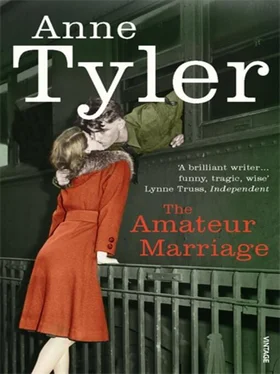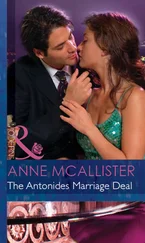He parked in front of his house and locked up, took his briefcase from the trunk, and waved to Julia Matthews who was just slipping into her Buick two doors down. As he started up his front walk he heard another car brake and reverse, and something made him turn to look. It was the Falcon, maneuvering itself into the space behind his Eldorado. The space was more than big enough but the driver had to make three passes before she managed to fit in, and even so she ended up about two feet away from the curb. Throughout the whole process, George stood waiting, facing the Falcon squarely and holding his briefcase at his side.
The woman got out and shut her door and started toward him. She was colorless and shabby, one of those people who dress for cold weather by piling on disorganized layers — not a single, appropriate-weight coat but a series of thick sweaters in various competing lengths over a cotton print dress. Wool knee socks and felt clogs gave her a bohemian air. Her dark, straight hair hung to her shoulders (a witchlike style in older women, George had always thought), and her eyes were brown and small and noticeably bright, even at a distance.
She stopped a few feet away from him. She said, “George?”
He had a feeling there was something that he was avoiding knowing.
“George Anton?” she said.
He took a breath and said, “Lindy?”
“It is you!” she cried, but she seemed just as disbelieving as he was. She started to step closer but then appeared to change her mind.
He had pictured this moment a million times. Now that it was actually happening, he felt uncomfortably aware of his forty-five-year-old self. Lindy’s own aging he had imagined with each passing decade, at least in a vague, theoretical way, but somehow he had never envisioned himself standing before her in his wide beige camel-hair coat, a chunky, faded-blond businessman with a briefcase in his fist.
“I’ve been following you for days,” she told him. “I hope I didn’t spook you. I was trying to get my courage up.”
“Courage!” he said. “Why would you need courage for me ?”
“I found your name in the phone book. You were the only one.”
She was clutching her purse with both hands — some sort of Native American-looking woven cloth pouch. Yes, she did seem nervous. “I looked for Mom and Dad,” she said, “for Karen… not a mention. Not even Anton’s Grocery. Where has everyone gone? What’s happened?”
It was he who stepped closer, finally. He thought of giving her a hug or kissing her cheek, but that seemed too intimate for a woman he no longer knew. Instead he took her arm and said, “Come inside, why don’t you.”
She could have pursued her questions, but she didn’t. Maybe she feared the answers. To cover the awkward silence, George made more of the walk to the house than he needed to, at one point steering her elaborately around a minuscule unevenness where a tree root had lifted a flagstone. Her clogs made a padding sound, like paws. Something she wore jingled. She would be the type to favor heavy, non-precious jewelry whose purchase benefited some disadvantaged tribal craftsmen.
He was relieved to hear the burglar alarm beep when he opened the door. Sally and Samantha must be out. Just for now, he would prefer this to be a two-person conversation. He set his keys on the credenza and crossed the hall to punch in the code. “Come on in,” he said, removing his coat. “May I take some of your… wraps?”
She didn’t answer. She was gazing around the room at the tapestry he and Sally had brought back from Florence, the little arched leaded-glass window, the French doors leading to the rest of the house. A crystal chandelier directly above her lit the top of her head, pointing out tiny flyaway wires of gray hair that gave her a hectic look. Her face had gone slightly soft, developed a sort of extra layer, and all her sharp angles seemed blunted. (As if she’d been wrapped in a sheet of fondant, George fancied.) But her voice still had the unmodulated, don’t-care-how-I-sound quality that he remembered from their childhood. “This is quite a place,” she said, and the squawking tone she gave “place” was eerily familiar.
He said, “Let’s go sit where it’s comfortable.”
He walked ahead of her, turning on lights, and Lindy followed. In the living room, she plopped herself on the sofa. George sat in the wing chair across from her, a low, glass-topped table between them. He was conscious of keeping his shoulders back, holding his stomach in.
Even so, she said, “You look a lot different.”
“Yes, well, I’ve been meaning to go on a—”
“Are you the last one left?” she asked him. “Tell me. I have to know.”
He said, “No, of course not.”
“In the phone book—”
“Oh, the phone book,” he said. “Karen changed back to Antonczyk; that’s why you wouldn’t have found her. And Dad: after he and Mom divorced—”
“Divorced!” Lindy cried.
“After they divorced, he remarried and moved to his wife’s house and so the telephone listing—”
“But what about Pagan?” Lindy broke in.
“Pagan’s fine.”
It wasn’t till she sank back against the sofa cushions that George realized how tensely she had been sitting. She said, “He grew up okay? He’s happy? He’s all right?”
“He’s fine, I told you. But as I was starting to say—”
“Was it Mom and Dad who raised him? They stayed together long enough?”
“Oh, yes. Or, no… I mean, they didn’t stay together long enough but they shared the care of him; so it all worked out. But anyhow, Dad’s listed under Anna’s name, Anna Stuart, and—”
“Anna Grant Stuart? Mom’s high-school friend?”
“I didn’t realize you knew her.”
“She came to see us once, when we were still on St. Cassian Street. She brought us a box of chocolate turtles.”
“I have no memory of that,” George said.
“Was Anna the reason for the divorce?”
“No, no. Good Lord, no; the divorce was, what, six or seven years earlier,” George said. He paused to remind himself where he was heading. “So, as far as Anton’s Grocery, well, first Dad moved it out to the county and changed its name, and then he sold it to World O’Food, must have been a couple of years ago now…”
“Dad hated World O’Food! He said chains would be the ruin of us!”
“… and that’s why you wouldn’t have found Anton’s Grocery in the phone book,” George plowed on. “Now, as for Mom, well…”
He swallowed.
“Mom, urn, in fact, she… died,” he said.
He felt a kind of jagged break in the air between them. He wished that he had thought of some less shocking term, maybe some ambiguous term that Lindy would misunderstand for a moment.
“She had a wreck,” he said. “Driving the wrong way on an exit ramp. Back in ’87, March of ’87.”
Lindy said, “Mom died? ”
Her eyes seemed all pupil.
“The police thought first she must have been drinking,” George said, “or high on drugs, or unconscious. They couldn’t believe that somebody in her right mind could have made such a mistake, till we explained to them that that was just how she drove.”
He attempted a light chuckle. Lindy failed to join in.
“But Pagan,” she whispered, finally. “Pagan’s all right, you say.”
“Pagan’s fine, Lindy.”
The shade of impatience in his tone surprised even him. She sent him a quick, sharp glance, and he ducked his head and mumbled, almost apologetically, “Though it does seem a bit late for you to be concerned.”
She went on looking at him.
“In my opinion,” he added after a moment.
She opened her Native American pouch and started rummaging through it. A warped leather billfold emerged, and a set of keys strung on red yarn, and a newspaper clipping folded to the size of a credit card.
Читать дальше












